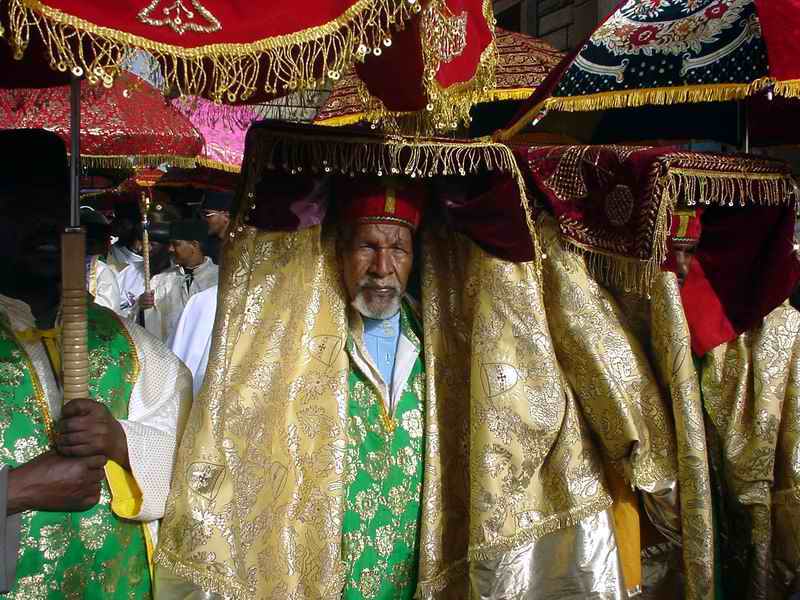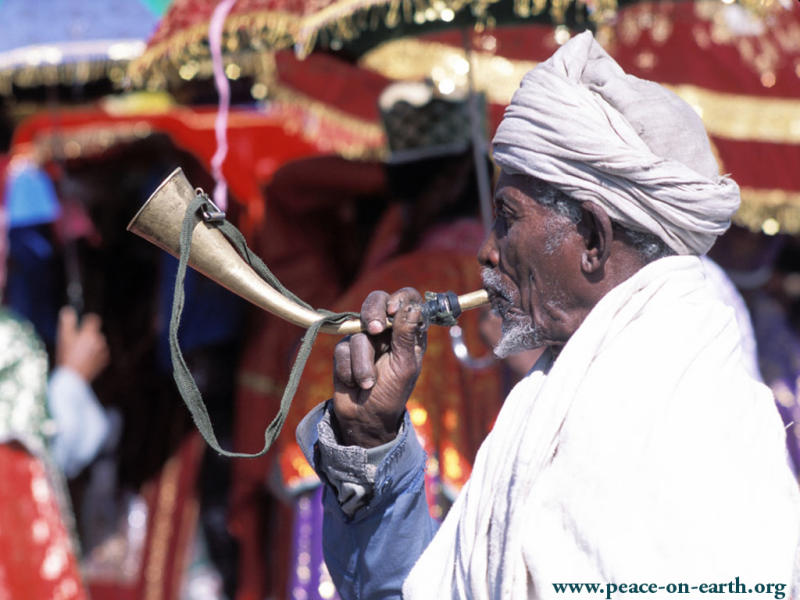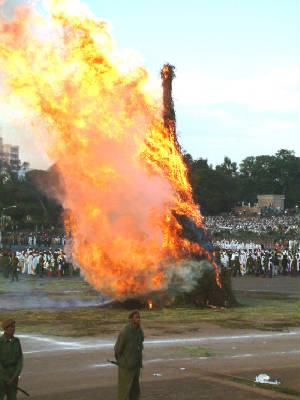|
Timkat (Epiphany), is the most colorful event in the year when Churches parade their
Tabots to a nearby body of water. This is the commemoration of Christ,s baptism, which falls on the 19th of January. The Tabot
is taken out in the afternoon on the eve of epiphany and stays overnight with the priests and faithful congregation.
|
The following morning the water is blessed and splashed
on everyone in a ceremony where the faithful renew their vows to the Church. If the body of water is large enough, some people
will immerse themselves. Woman who have been unable to have children participate in the ritual for fertility. After the ceremony,
the Tabot is paraded back to its Church accompanied by much singing and dancing.
|
|

|

The traditional horns herald the beginning
of the three-day festivity of Timkat in Ethiopia
|
|
Lidet or Gena, the Ethiopian
Christmas is not the primary religious and secular festival that it has become in Western countries. Falling on the 7th of
January, it is celebrated seriously by a Church service that goes on throughout the night, with people moving from one Church
to another. Traditionally, young men play a game similar to hockey called Gena on this day, and now Christmas has also come
to be known by this name.
|
Fasika (Easter) is a festival that follows a fasting period of 55 days. During this
time, no animal product is eaten. The faithful do not eat anything at all until the daily service is finished at around 3
in the afternoon. From Thursday evening before Good Friday, nothing is eaten until the Easter-service ends at 3 in the morning
on Easter Sunday.
|
|

|
Meskal falls on September 27 and is said to be in memory of Finding of the True Cross
by Empress Heleni.Bonfires are lit throughout the country the night before the celebration and on the day of the celebration
there is a bonfire topped with an image of a cross, to which flowers are tied. Priests in full regalia bless the bonfire before
it is lit. This festival coincides with the mass blooming of the goden yellow " meskal daisies", called adey abeba
in Amharic.
|
|
Enkutatash, New Year
The Ethiopian New Year falls on September11; at
the end of the big rains. The sun comes out to shine all day long creating an atmosphere of dazzling clarity and fresh clean
air. The highlands turn to gold as the Meskal daisies burst out in all their splendor. Ethiopian children--clad in brand-new
clothes--dance through the villages giving bouquets of flowers and painted pictures to each household.
The day
is called Enkutatash meaning the "gift of jewels." When the famous Queen of Sheba returned from her expensive jaunt
to visit King Solomon in Jerusalem, her chiefs welcomed her back by replenishing her treasury with enku or jewels. The spring
festival has been celebrated since these early times and as the rains come to their abrupt end, dancing and singing can be
heard at every village in the green countryside. After dark on New Year's Eve people light fires outside their houses.
|
To spend one of the holidays in Ethiopia you may book a tour with ENTTO. To
contact us by emailCLICK HEREYou may contact us by phone in Ethiopia at 251-11-552-6622/ mobile phone 251-91-120-7095 or in America you may call 571-208-1379
.
|